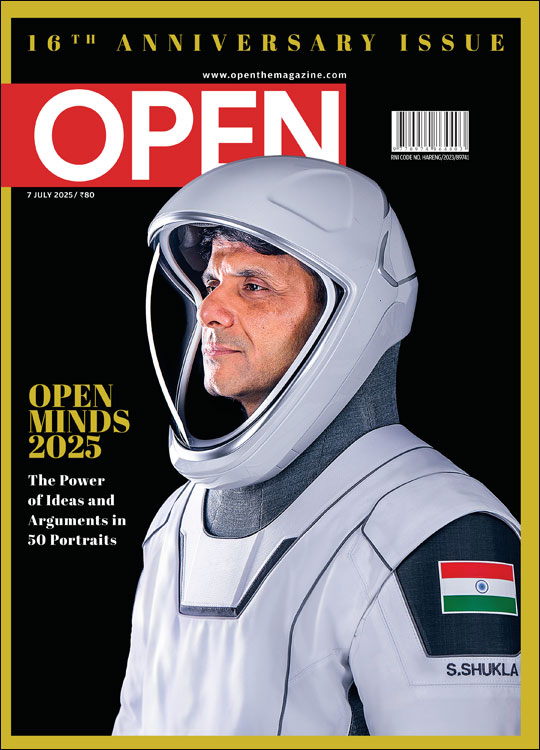Under-17 World Cup: A Shot At Glory
India may be out of it but the Under-17 World Cup made its football dream bigger
 Siddhanth Aney
Siddhanth Aney
 Siddhanth Aney
|
18 Oct, 2017
Siddhanth Aney
|
18 Oct, 2017
/wp-content/uploads/2017/10/Ashotatglory1.jpg)
DID YOU GET a text from your father,” a journalist asks Timothy Weah, 17, in New Delhi. The young Liberian-American was meeting the press after his US side completed a 5-0 rout of Paraguay in the pre-quarterfinals of the FIFA Under-17 World Cup on October 16th. He scored three of those five, including a screamer from outside the box that curled in over the Paraguayan goalkeeper into the right corner.
It’s a line of questioning Weah is probably already used to, despite not having to deal with the press on a daily basis. He does, after all, come from great footballing stock. His father, George, is a national hero who, in 1995, became the first African player to win FIFA’s Ballon d’Or—the prize handed out annually to the best player in the world.
But George might be a tad preoccupied these days to pay too much attention to his son’s exploits in India. On the same day his son scored a hat trick, Liberians voted in the first round of presidential elections. George emerged as the frontrunner and is set to face a elections with ruling party candidate Joseph Boakai on November 7th.
The small nation, on Africa’s western coast, is hoping for its first democratic (and peaceful) transition of power in 73 years. The new president will take over from Nobel and Indira Gandhi Peace Prize laureate Ellen Johnson Sirleaf—the first woman to be elected head of state in Africa and responsible for quadrupling the nation’s GDP in her two terms at the helm. With the memories of the violence that tore the country apart in decades of civil war still vivid, it is a delicate time for the nation of 4.5 million.
It is not surprising, therefore, that Timothy communicates more with his mother these days. A fact that also puts, quite well, into context the entire tournament that India is using to announce its arrival on the global football scene.
The Under-17 World Cup is many different things to many different people. To FIFA, it is the ‘first’ World Cup. At this age (the current tournament is restricted to those born in 2000-01) many players are amateurs under the legal care and control of their parents and guardians. It is an opportunity to spread the game in nations such as India without having to spend astronomical figures on infrastructure and associated costs. At this point, FIFA still looks at it as an expense rather than an income.
For many African and South American nations, it is the opportunity to showcase some of their best players on the international stage—with live TV coverage—in the hope that a few of them may be picked up by European clubs.
For Asian nations, such as Iran and Japan, it is an opportunity to compete against the best in the world before the gap widens to almost unbridgeable levels at the senior stage.
For India, this tournament was a first. Once the Government, back in 2010-11, pledged its support to football, it was taken as a given that India would play host in 2017. For global football’s operations and marketing guys, this was the start of something that has not been seen on any scale since USA 94. For India, it was a chance to catalyse the growth of football through presenting a national team at a World Cup.
Had we waited for this to happen organically, it may have taken another couple of decades. In a very short period, a ton of effort and money has been pumped into developing football at the grassroots. States such as Manipur and Mizoram are receiving more than passing mentions in national dailies. Even New Delhi—traditionally disinclined towards the sport—turned out in droves to watch the games held in the city.
For the Government of the day, it is another opportunity to harness the power of public relations and optical illusions. For Indian journalists, some of whom have been covering the sport for decades, it is an opportunity to write about a Word Cup at home with a fuller understanding of the contexts in which the carnival is operating.
For European football journalists—consumed by reporting on every in and out of the professional game—the event is barely a footnote. When this correspondent contacted friends and colleagues in England, France, the Netherlands and Germany, to discuss the upcoming tournament the response was pretty standard. “Tell us how it went” was the norm. With some adding: “If you spot some talent that isn’t already with a European club, give us a shout.”
For Asian nations, it is an opportunity to compete against the best before the gap widens to unbridgeable levels at the senior level
The real football economy doesn’t allow for such luxuries as column inches for under-17 events. But for each one of the 504 players taking part in this tournament, there is only one goal. Starting a career in professional football at whatever level they can. For more on this context let’s get back to the tale of Timothy Weah.
Just months before arriving in India with Team USA, Timothy signed a professional contract with Paris Saint-Germain. The French club, already dominant on the domestic scene, harbours ambitions of becoming the biggest in Europe. Their recent signing of Brazilian superstar Neymar—for nearly Rs 1,700 crore— from FC Barcelona indicates the level at which they are playing the game. For PSG, Timothy is one of several dozen prospects on the books. His pedigree results in certain advantages, for sure. A foot in the door is one. In a city that is teeming with local talent, and considered one of the most competitive footballing environments on the planet, signing for the local big boys is not a walk in the park. But his father George has an old association with the club. He moved to PSG after Arsene Wenger brought him over to Monaco, and finished his first season there as top scorer in the UEFA Champions League. Based on these links, Timothy might even get a little more interest from the coaches than some of the other boys. When he scores goals at the youth level, he will receive a lot more interest from the press than his teammates or opponents. But that is where it ends. Everything else will have to happen on the pitch, on his own two feet.
The pressure is more on Team USA than on most others in this tournament. The established European and South American nations aren’t too bothered. Some of their best players—Vinicius Jr from Brazil will join Real Madrid when he turns 18 after a deal in the realm of Rs 300 crore—have already decided not to come to India. They are already focused on securing playing XI positions in first teams at top-flight clubs. But the US is on the cusp. It is the only nation to have competed at all 16 world cups to be held at this level. Its senior team has steadily improved. In Christian Pulisic (19, Borussia Dortmund), they have a world-class superstar in the making. But they are not yet considered a serious footballing nation by the old guard. We all know how much the Americans hate that. So, winning this Under-17 tournament becomes a little more consequential.
Already, Timothy’s generation is being talked about as the best the US has ever produced. His teammates, such as Chris Goslin, Ayo Akinola, Andrew Carleton and Josh Sargent, are up there with the best in the age group. Now that the senior squad is out of contention for the World Cup in Russia next year, the interest in this generation has heightened. While interest and expectation are essential for the sport to grow, many of us on the outside forget that, at the end of the day, we are talking about 17-year-old kids. Kids who are referred to as ‘products’ of this academy or that. ‘Prospects’ that can be built into goal-scoring machines with the potential to drive multi-million dollar deals. The reality is very much more pessimistic.
Take the Nigeria under-17 squad that won this very tournament in 2007. Today, those boys, between the ages of 26 and 27, are at their physical peak. But not a single one of them plays for a European club. Not a single name will even a serious non-Nigerian fan be able to recall.
For Timothy to find balance, he need only look as far as his elder brother, George Jr. Also a promising player in his younger days, Junior began his youth career at another of his father’s former clubs, AC Milan. He never made the transition to the first team and has spent 10 years playing bit roles at clubs across Europe. He played a couple of games for PSG’s reserve team, but was let go soon after. Now 30, Junior might still make a career in football. But it will not be as a player.
The England under-17 squad are massive favourites with Indian fans because many of their squad come from the academies of Premier League side such as Chelsea and Manchester United. However, it is entirely possible that none of them will make it through to the senior side in the next two or three years. They are, after all, competing with senior players on whom the club spends millions of pounds every week.
So there is stagnation, depression, anger and boredom. These are football battles that are often fought in the mind. And because the only people who can relate to your problems are fellow professional players, it often becomes a very lonely battle for young men to fight. There is much talk of Timothy walking out of the shadow of his father. Nothing should be further from his mind. At 17, there is nothing he has achieved that can be compared with George’s list of accolades. But because of his father, Timothy has, hopefully, a support system that can lead him through the mental quagmire that is the football economy. And that is worth more than its weight in gold.
On October 10th, World Mental Health Day, we were in conversation with former India midfielder Renedy Singh and former Newcastle striker Michael Chopra. Renedy said the Indian boys were lucky because they are, for the time being, protected from the harsh realities of global football. The 21 boys who made the final squad that represented India have become minor celebrities, but most of them will play senior football in India. For this they are well prepared and have seniors who will be willing to help. As long as they keep egos in check and feet on the ground. Boys such as goalkeeper Dheeraj Moirangthem, defenders Anwar Ali, Boris Thangjam and midfielder Rahul KP will soon be picked up by clubs and will be playing with and against men. They will need to forget the high of being the first Indians to play at a World Cup finals tournament and focus instead on more mundane activities such as training in nondescript Kolkata , fighting for spots on the team, doing favours for senior players and challenging for the senior national team. If they believe they have arrived—or that the world owes them something—football will give them a very rude awakening.
Chopra—who has had personal battles with failure and gambling— believes there is greater awareness of some of these issues today than when he was a teenager looking to make a mark. There are support groups, players’ associations and mental health professionals who can help in difficult times. But, at the end of the day, football remains a macho sport. And footballers (apart from those select few who play for the biggest clubs in the world) have to operate in difficult conditions, earning little money and living in alien lands. It may be a team sport, but to survive it, every individual needs to be either tough as nails or extremely lucky. Most successful players turn out to be both. As India’s dalliance with this World Cup comes to a close, we can only hope that these less talked about aspects of the game are being given due importance by those shaping the lives of the kids who have given us so much joy and entertainment over the past month. Most of them will not make a life in football, but it is our collective responsibility that they are decently equipped to build something outside of it.

/wp-content/uploads/2025/06/Cover-OpenMinds2025.jpg)













More Columns
Indian Companies Have a Ransomware Vulnerability Open
Liverpool star Diogo Jota dies in car crash days after wedding Open
'Gaza: Doctors Under Attack' lifts the veil on crimes against humanity Ullekh NP